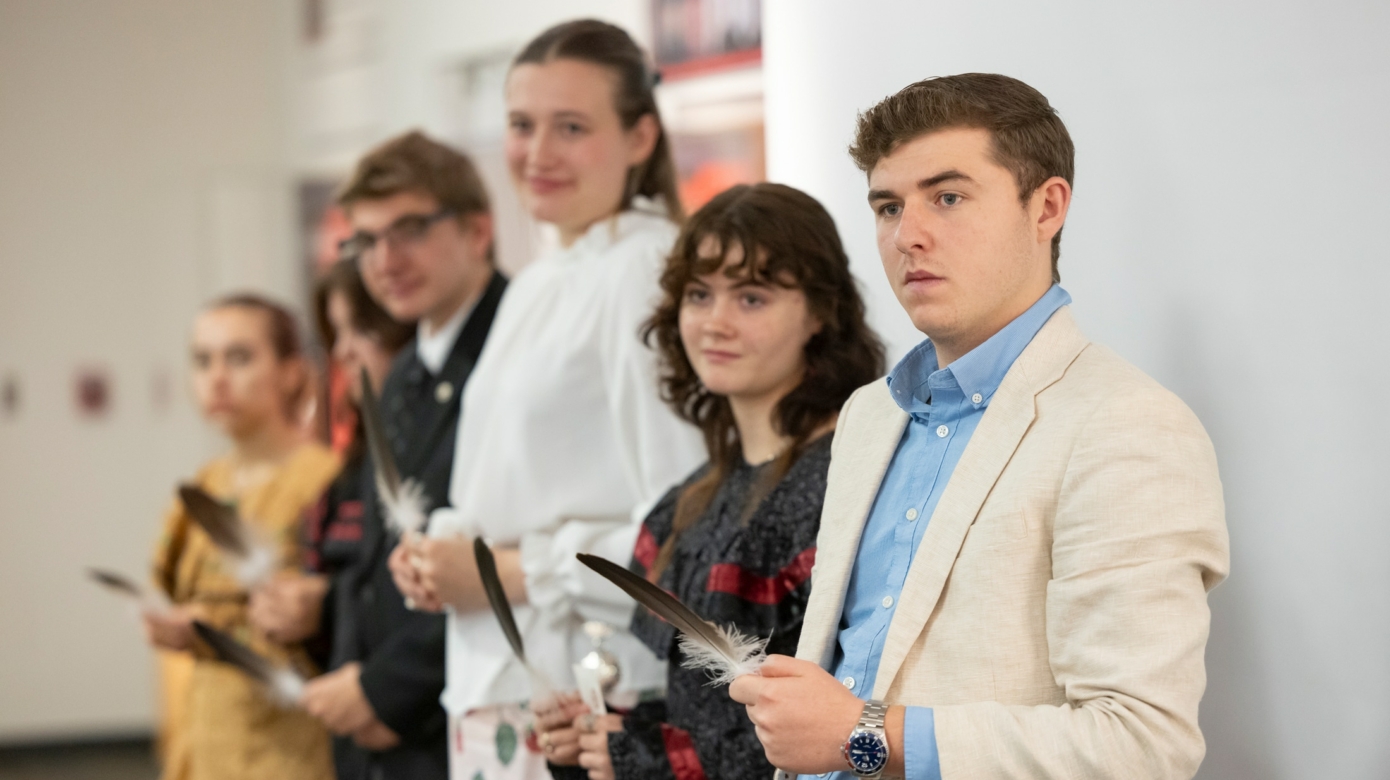As the annual Potawatomi Leadership Program drew to its close, the participants reflected on what they learned throughout their six weeks with Citizen Potawatomi Nation and encouraged other Potawatomi youth to apply for next year’s program.
Each year, the Nation welcomes several college-age Tribal members to learn about its culture, history and government.
The 2023 program participants were: Amity Tarter, Tarter family, Berkeley, California; Ike Decker, Ogee family, Topeka, Kansas; Justice Wolfe, Curley family, Jones, Oklahoma; Roslyn Bellscheidt, Kennedy family, Vashon Island, Washington; Grey Doster, Johnson family, Lebanon, Pennsylvania; and Tate Lewis, Barnett family, Paris, Texas.
“There is no other educational opportunity like this that allows you to learn this much from your culture,” Decker said. “There is no other program like this, and I would highly recommend it to anyone.”
“This program has been super important to connect me to that culture, and I didn’t expect to be able to retain this much information in six weeks,” Tarter said. “So, if there are people who feel a disconnect like that, I think that this is a great opportunity to take advantage of.”
“You receive nothing but just the most loving people, generous people, and they provide you with so many resources and everything you could need for the six weeks you’re here and so many beautiful connections I’ve made while being here,” Lewis said.
“If you’re afraid to apply because you feel like you won’t fit in or it wouldn’t be the right fit for you, I’m telling you that there are so many experiences, so many different opportunities that we get to have,” Bellscheidt said. “This experience will help you learn and grow. And it is for everyone. And I hope that you take the chance and apply.”
A deeper connection
Part of forging a deeper connection with their Potawatomi roots involved learning Bodéwadmimwen, crafting items like moccasins and hand drums, and learning about Potawatomi spiritual and cultural practices. Students also participated in talking circles to share their experiences both as individuals and as Potawatomi.
Some members of the group had always wanted to attend PLP, while others were inspired by an older sibling or relative to attend. Whatever the reason, each student hoped to learn more about their family’s history and Tribal history.
“I could always say that I was Potawatomi, but I couldn’t exactly say what that culture meant to me,” Tarter said. “Last year, my older brother attended (PLP), and he came back with a lot of information, and he brought back a lot of culture. So, I felt like it would be pretty important for me to do the same and get the experience while I’m able to.”
In addition to cultural teachings, they also witnessed the importance of tribal sovereignty. During the six-week program, the U.S. Supreme Court issued its opinion reaffirming tribal sovereignty and the Indian Child Welfare Act. They also learned how sovereignty impacts environmental protection efforts.
“Getting to hear from FireLodge (Children and Family Services) was especially impactful and hearing about all the services that they provide for all types of people within the community, especially children and foster kids,” Bellscheidt said. “The Environmental Department had to be my favorite session we attended. It was just an incredible experience and really built my foundational knowledge about local environmental issues.”
While their reasons for applying for PLP may differ, each participant received knowledge they will continue to carry with them in the future.
“I feel like the view of our culture is just to be respectful, to give back, to acknowledge your existence and acknowledge earth. And I think that’s really cool because it’s a little bit different than a Western view of living with the earth,” Tarter said.
“I think one of the most important things that I learned and will probably continue to learn will be of our Native language,” Decker said. “I believe it was very important and very informative to learn, but also to keep going forward and to continue learning our language and potentially teach it to others.”
Final reflections
At a reception honoring the participants, teams of two presented a special project they created together during their time in the program. Projects can include programs, services or enterprises they envision for the Nation’s future.
Doster and Tarter created Native Environmental Curriculum, a lesson plan targeted toward elementary-aged children that helps Potawatomi youth better understand how to care for the natural world, using Potawatomi spiritual and cultural beliefs as the basis.
Insight Into PLP was presented by Tate Lewis and Justice Wolfe. This project focused on promoting the PLP to a wider audience to encourage more Potawatomi youth to participate. They created a photo slideshow and videos and used PLP alumni testimonials to help increase awareness of what the program involves and what participants can expect.
Roslyn Bellscheidt and Ike Decker created Combatting Caricature: Reclaiming Indigenous Representation in Mainstream Media. This project features a comic book, written in Bodéwadmimwen, to counteract negative and harmful stereotypes of Indigenous people often used in mainstream media. The book portrays Potawatomi people in a respectful manner while encouraging new generations to learn Bodéwadmimwen.
Attending the reception were Tribal Chairman John “Rocky” Barrett, Tribal Vice-Chairman Linda Capps and District 10 Legislator David Barrett.
Program participants received gifts from Chairman Barrett, Workforce and Social Services Director and PLP housemother Margaret Zientek and PLP counselor Braden Bruehl to commemorate their time at CPN headquarters.
For more information about the 2024 Potawatomi Leadership Program, email college@potawatomi.org or visit plp.potawatomi.org.

